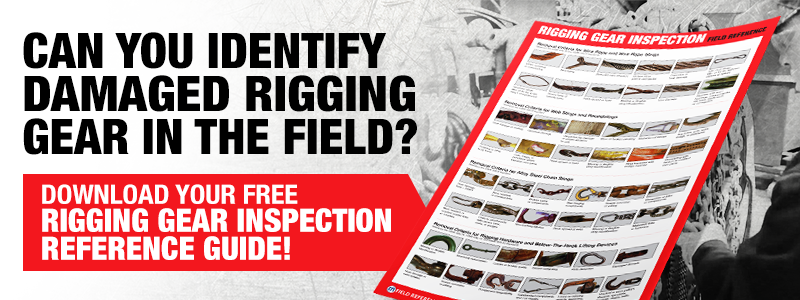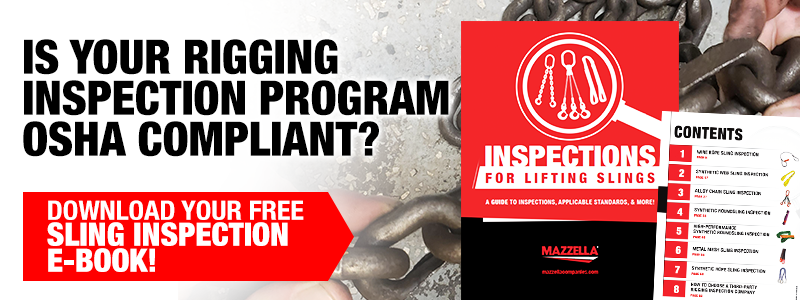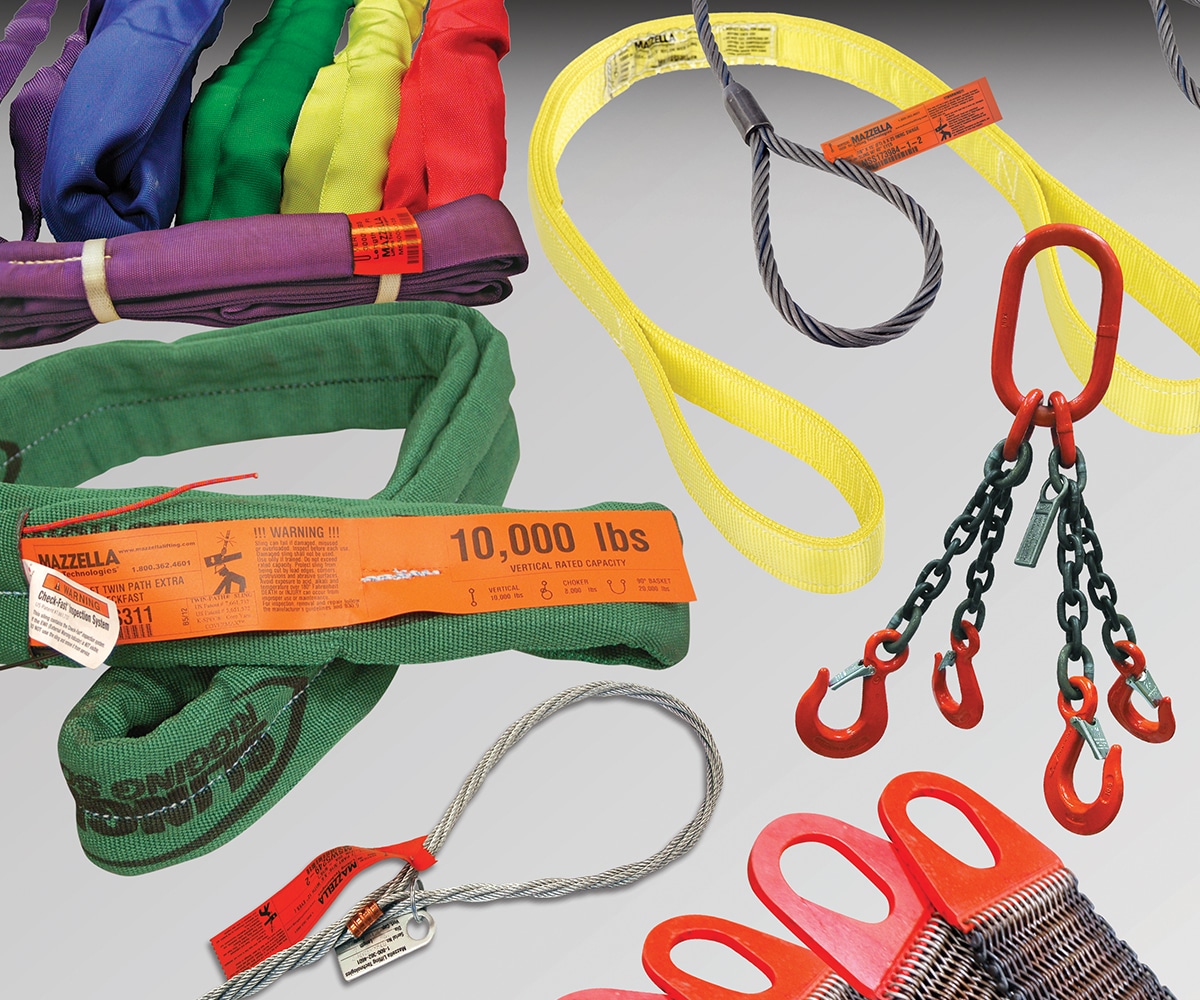When Does OSHA Require Proof Testing & Load Testing?
Regular proof testing of lifting slings is not required by ASME standards, but when are proof tests required for rigging gear? The ASME standards list when proof testing and other forms of tests are required for your lifting and rigging gear.
“Is it time for proof tests, or are periodic inspections more in line with my company’s needs?”
Lifting and rigging specialists hear that question all the time and understand there’s some confusion between the two.
A proof test is defined by the American Society of Mechanical Engineers (ASME) as a load test demonstrating the fitness of a load-bearing structure. However, not all pieces of lifting and rigging gear need this kind of testing.
While there’s not regularly mandated testing, there are situations where it’s warranted.
In this article, we’ll answer the following questions:
- Do you need to proof test all of your lifting slings?
- Is there anything that needs to happen after my below-the-hook device is load tested?
- What is NDT (non-destructive) testing?
- Is magnetic particle testing required by OSHA or ASME?
- When is a proof test required?
Do You Need to Proof Test All of Your Lifting Slings?

The simple answer is no.
Most businesses only need a periodic inspection of their rigging gear. Our specialists have seen customers confuse inspections and proof tests. When service providers start asking questions, they discover most of the time, customers are substituting the words “proof test” for “visual inspection.”
If you’re inspecting to the ASME B30.9 Slings standard, there’s no requirement for any proof testing across any product whatsoever.
It is important to remember that you need to perform an initial inspection to make sure the products you ordered from the manufacturer are in line with industry standards. Also, all lifting slings need to be inspected daily, or prior to each use, by a designated person as part of a frequent inspection.
OSHA (the Occupational Safety and Health Administration) requires documentation that your lifting slings have been inspected by a qualified person at a minimum of every 12 months. Qualified inspectors are trained to find any physical defects, and if they do these inspections as often as Mazzella rigging inspectors do, you can trust they’ll spot any hazards and inform you if your sling(s) meet the criteria for removal from service.
OSHA 1910.184 requires all new, repaired, or reconditioned alloy chain slings to be proof tested by the manufacturer or equivalent entity.

Is There Anything That Needs to Happen After My Below-the-Hook Device is Load Tested?
After the load test, your below-the-hook lifting device needs to be visually inspected by a qualified person to make sure no damage, deformation, cracks or defects occurred during the test.
Discontinuity is defined as: “Any interruption in the normal physical structure or configuration of a part, such as cracks, laps, seams, inclusions, or porosity. A discontinuity may or may not affect the usefulness of a part.”
Also, you should receive records after the test has been performed and the inspection is complete.
What Is NDT Testing?
NDT stands for Non-Destructive Testing, and includes proof testing.
Proof testing is defined as “a non-destructive tension test of a piece of equipment, device, sling, or components.”
NDTs, like magnetic particle testing, ultrasonic testing, and / or dye-penetrant testing, is used to test for any hidden fractures in the welds or other defects that would not be visible to the naked eye. These tests are done without damaging the rigging equipment.
You could have your BTH device go through an NDT after a load test, but that is not mandated by the standards.
Magnetic Particle Testing
Magnetic particle testing is where a magnetic field is introduced into an object using a dust.
If done properly, the yield will be what’s known as an “indication” of cracks or other issues that could meet removal from service criteria. Should indications be found, further tests are required to make that determination.
It’s limited due to several factors. Items can’t be painted because this is a surface and shallow sub-surface test. Magnetic particle testing can’t penetrate the paint. For this testing to work, the paint must be grinded off.
Example: Think about a spreader beam. They’re painted yellow, but if you need an inspection of the bale, you can’t use magnetic particle testing to examine the equipment.
Dye-Penetration Testing
Dye-penetration testing must be done by a certified person, and is used on very specific pieces of rigging equipment made of non-porous materials like ceramics, plastics, and metals.
This applies to equipment used in temperature-controlled environments, and the item has to be explicitly clean. That’s a multi-step, labor-intensive process. This is a costly process for customers because the kits required to do these tests are very expensive.
Is Magnetic Particle Testing Required by OSHA or ASME?

Nowhere in OSHA standards or ASME B30.9 Slings, ASME B30.10 Hooks, ASME B30.20 Below-the-Hook Lifting Devices, or ASME B30.26 Rigging Hardware standards does it require you to have non-destructive testing or magnetic particle testing performed on your rigging or overhead lifting equipment.
Since there’s no requirements in industry standards, we’ve found it’s almost always a customer request. We’ve seen companies hire third-party specialists to do more complex tests than necessary when a periodic inspection would’ve been sufficient.
Before ordering a test, you should ask yourself: What has happened to the inside of a crane hook over the last 20 years since it was forged?
Unless something happened at the time of manufacture, where it was a poor forging or casting, nothing would start on the inside.
When you’re thinking about non-destructive testing and the different ways of using it, it’s often not needed.
When is a Proof Test Required?
While regular proof tests are not required by any written standard from ASME or OSHA, there are times when proof tests are required by ASME B30.9 Slings.
Before Mazzella does an inspection or proof test, we’re going to educate you on the differences between the two. During that process, we’ll help you identify which option is best for your business.
According to ASME standards, these are situations where proof tests are required to be performed, by the sling manufacturer, before the sling is sold and put into service:
Alloy Steel Chain Slings
“Prior to initial use for all new and repaired chain and fittings of an alloy steel chain sling shall be proof tested either individually or as an assembly by the sling manufacturer or a qualified person.”
Wire Rope Slings
“Prior to initial use, all new swaged socket, poured socket or turnback swaged eye type slings, and mechanical joint endless wire rope slings shall be proof tested by the sling manufacturer or a qualified person.
“Prior to initial use, all wire rope slings incorporating previously used or welded fittings and all repaired slings shall be proof tested by the sling manufacturer or a qualified person.
“All other new wire rope slings are not required to be proof tested unless specified by the purchaser.”
Metal Mesh Slings
“Prior to initial use, all new and repaired metal mesh slings shall be proof tested by the sling manufacturer or a qualified person.
“Coated slings should be proof tested prior to coating.”
Synthetic Rope Slings
“Prior to initial use, all synthetic fiber rope slings incorporating previously used or welded fittings and all repaired slings shall be proof tested by the sling manufacturer or a qualified person.
“All other new synthetic fiber rope slings and fittings are not required to be proof tested unless specified by the purchaser.”
Synthetic Webbing Slings
“Prior to initial use, all synthetic webbing slings incorporating previously used or welded fittings and all repaired slings shall be proof tested by the sling manufacturer or a qualified person.
“All other new synthetic webbing slings and fittings are not required to be proof tested unless specified by the purchaser.”
Polyester Roundslings
“Prior to initial use, all polyester roundslings incorporating previously used or welded fittings and all repaired slings shall be proof tested by the sling manufacturer or a qualified person.
“All other polyester roundslings and fittings are not required to be proof tested unless specified by the purchaser.”
High-Performance Roundslings
“Prior to initial use, all high-performance roundslings incorporating previously used or welded fittings and all repaired slings shall be proof tested by the sling manufacturer or a qualified person.
“All other new high-performance roundslings and fittings are not required to be proof tested unless specified by the purchaser.”
How Can Mazzella Help You with OSHA Compliance?

As a one-stop shop for your lifting and rigging needs, Mazzella has a diverse range of products and services that can help you execute safe overhead lifts.
At Mazzella, we provide ideal lifting solutions — offering all styles of lifting slings, rigging hardware, wire rope, overhead cranes and hoists, and engineered lifting devices. We have more than 30 locations across the United States — fully stocked with different sizes and configurations of rigging products for your next project.
Rigging Inspection Services
OSHA 1910.184, ASME B30.9 Slings, ASME B30.20 Below-the-Hook Lifting Devices, ASME B30.26 Rigging Hardware & ANSI Z359 require…
Periodic, documented inspections on slings, rigging hardware, lifting devices, and fall protection every 12 months, at minimum, and monthly to quarterly in more severe service conditions.
Our rigging inspectors are certified to make sure your products meet OSHA and ASME requirements. Also, we provide personal fall protection inspections and basic level NDT inspections to support our visual inspections.
Rigging Training
If you require a specific training course for OSHA compliance for slings, hoists and / or rigging hardware, Mazzella can assist you in creating a safe and reliable workplace.
Our rigging training focuses on:
- Overhead cranes
- Below-the-hook lifters
- Lifting slings
- Rigging hardware
- Wire rope
Also, we provide site assessments. The purpose of an assessment is to systematically observe and record your lifting and rigging procedures, equipment, and records. This is not an inspection, but rather, a general assessment by which opportunities for improvement may be identified.
All Mazzella trainers have been accredited by our company through training by a third-party company (Industrial Training International, Inc.), Mazzella Companies’ internal Train-the-Trainer program, and are educated on OSHA and ASME standards.
Hardware
We offer one of the largest and most complete inventories of rigging and lifting products in the country from some of the largest manufacturers in the world. Some of the products we stock are:
- Shackles—all types, sizes, and finishes from ¼ ton to over 1,000 tons
- Hoist rings—standard and metric
- Eyebolts—forged, metric, and stainless steel
- Hooks—swivel, eye, choker, self-locking, and weld-on
- Master rings / links—all sizes, types and finishes
- Turnbuckles and Swivels
Also, we stock many other rigging hardware items.
If you can’t find a standard item to meet your specific needs, inquire about custom rigging and lifting hardware. All hardware products meet the ASME B30.26 Rigging Hardware specification.
Lifting Slings
Mazzella provides all types of lifting slings, including alloy chain, wire rope, metal mesh, synthetic flat web, cordage, and single-path / high-performance roundslings.
If you order from our standard wire rope and synthetic slings inventory before 2 p.m. ET, your products will ship the same day!
If you need custom lifting slings to meet your specifications, we will fabricate the slings and / or assemblies to meet your needs. With custom sling orders, production and delivery times will take longer.
Mazzella provides wire rope assemblies—both large and small. We manufacture bridge cables, crane cables, steel mill cables and thousands of OEM (original equipment manufacturers) assemblies. Also, we can manufacture assemblies with standard or custom end-fittings. Special testing and tolerance requirements are available, too.
Call us at 800.362.4601 or click here if you need rigging hardware, training, or inspections!



Lifting Slings & Assemblies
Are you looking for lifting slings? Whether you need chain, wire rope, synthetic flat web, metal mesh, cordage, and single-path / high-performance roundslings, Mazzella can help provide the right sling for your needs!
Learn more about lifting slings and assemblies!
Copyright 2023. Mazzella Companies.
